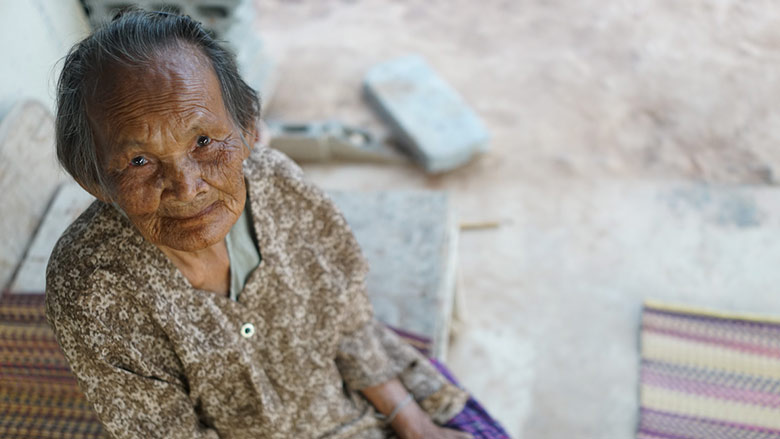BANGKOK, April 8, 2016 – Thailand is aging and the number of people who are elderly and suffering from increased health problems will soon outpace the capacity of Thailand’s healthcare services, especially in poor, rural areas. Expanding the roles of Local Administrative Organizations (LAO) and Village Health Volunteers (VHVs) could help meet these increased demands, according to a new World Bank study Closing the Health Gaps for the Elderly: Promoting Health Equity and Social Inclusion in Thailand.
”Thailand can consider reforms now to help achieve wide coverage of its social security, health and long-term care systems, with adequate financial protection for the elderly, while ensuring that public spending remains sustainable,” said Ulrich Zachau, World Bank Country Director for Southeast Asia. "We all have elderly family members or friends who need care. It is important to provide access to basic healthcare services for the elderly, and to implement effective measures to help the elderly take advantage of basic health care, especially in remote rural areas.”
In 2015, over 10 percent of the Thai population, or more than 7 million people, were 65 years old or older. By 2040, a projected 17 million Thais above 65 years of age will account for more than a quarter of the population. Together with China, Thailand already has the highest share of elderly people of any developing country in East Asia and Pacific, and it is expected to have the highest elderly share by 2040.
While all Thai citizens have been included in the universal health coverage since 2002, the report finds that many old people face challenges in using available health services. One key challenge for the elderly is that they depend on caretakers and relatives to bring them to health facilities. This is a particular plight for the elderly poor, those in the oldest age group who are over 80 years old, and those who live in rural areas.
“At age 55-65, most people are able to travel independently to health facilities. But, as they grow older, they become frail and start to have health conditions that prevent them from travelling to health facilities independently. Once the elderly people become dependent and need others to bring them to health facilities, the frequency of using services at health facilities generally drops. This trend is actually stronger among poor elderly, particularly those in rural areas and those who do not live with their adult children,” said the report author, Sutayut Osornprasop from the World Bank.
According to the report, the lack of public and affordable transportation is the most important barrier to accessing health services among older people in rural areas, especially for those who do not live nearby major highways and roads on which public buses operate. Increasingly, older rural people who are poor and live on monthly social pension allowances alone are the most vulnerable, without money to pay for travel to health facilities when they are sick, or food and accommodation near often distant hospitals.
“Poor elderly in rural areas face many barriers to accessing health care services. They not only need to pay for expensive transportation costs to reach hospitals but also food and accommodation. Usually, they also need caretakers to bring them to hospitals, so the costs increased further. There are many cases of the elderly borrowing money to pay for these costs to access health care services,” said Siriwan Arunthippaitoon, Senior Expert on Older Persons, Department of Older Persons, Ministry of Social Development and Human Security.
Village Health Volunteers are instrumental to the provision of health-related support to the elderly in communities, particularly through home visits as well as organizing physical exercise and health education sessions. Several local administrative organizations have played an important role in promoting access to health services for the elderly in rural communities, including providing health emergency vans and health promotion activities for the elderly in the communities. Thailand can promote and scale up these good practices, as well as outreach and home visit services by health professionals and measures to facilitate travel to health facilities by the poor elderly when needed.

